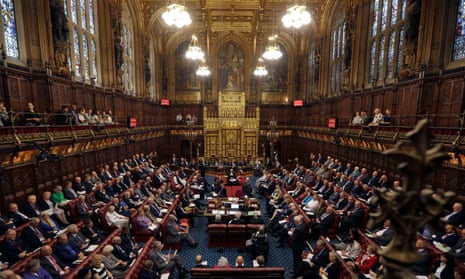John Bird painted a grim picture of the UK with a reduced library service, warning the House of Lords on Thursday that cuts would result in “disorder, crime, problems for schools and the fact that children will not be able to get a job because they will not have the skills and abilities”.
Opening a debate on libraries, bookshops and booksellers, the Big Issue founder told the house that “we have lost more than 500 [libraries] since 2010”, and almost 9,000 librarians. Describing the UK’s public library service as essential, he called on the government to “supply some emergency relief money to stop local authorities doing this dastardly deed, this process of philistinising our communities”.
“When government departments cut budgets in one particular area, it tends to find a manifestation in another area,” Lord Bird said. “For instance, if you start cutting the number of libraries – we have lost more than 500 since 2010 – you are building up a bill that will occur in another part of government. It will be shifted into disorder, crime, problems for schools and the fact that children will not be able to get a job because they will not have the skills and abilities. So if you wish to cut libraries, please do so – but do it on the basis that you build more prisons and more hostels for homeless people and put higher walls around your house.”
His views were backed by a host of other members, including Gail Rebuck, chair of Penguin Random House and a Labour peer, who said that “our trajectory towards one library per 50,000 people is simply a disaster”.
“We have a stark choice,” Baroness Rebuck said. “If we lose our celebrated bookshops and libraries we will never improve our nation’s literacy. We will also lose our next generation of authors and the source of our competitiveness in the creative industries. This simply cannot be allowed to happen.”
Library closures were described as “appalling” by Nicholas Trench, the earl of Clancarty, while Lord Griffiths channelled Jane Austen to tell the House of Lords that “it should be a truth universally acknowledged that any civilised society worthy of the name must be in want of libraries”.
Labour peer Ray Collins, meanwhile, slammed Ed Vaizey for his lack of action when he held the position of culture minister, saying that Vaizey “refused to intervene in any library reductions”, and that “sadly, when many library services were under threat we had a minister with no sense of urgency, no coherent strategy or strategic direction, no guidance for local authorities and no idea what might be the minimum acceptable outcome”.

Lord Collins also asked the government about the Chartered Institute of Library and Information Professionals’ belief that “changes made to library services without reference to an appropriate statutory guideline may be unlawful”.
“What discussions has the minster had with the institute on these alleged breaches of statutory duties?” asked Collins. The Chartered Institute of Library and Information Professionals (Cilip), has asked the government to act, suggesting that further library closures could be against the law.
In response, Lord Ashton, the parliamentary under-secretary of state for culture, media and sport, told the House of Lords that secretaries of state take their power to intervene in a local authority’s decision to close libraries by directing a local inquiry “seriously, and carefully consider complaints that are lodged”.
Ashton said that Collins “was right to say that the power of inquiry has been used only once in the past 52 years – in the Wirral in 2009, under a Labour government – but, in answer to his question, the Department for Culture, Media and Sport has investigated 11 complaints raised in respect of a number of library authorities in recent years”. He added: “The secretary of state at the time of each of these previous complaints decided not to order a local inquiry.”
He added that the DCMS “is currently investigating four further complaints relating to Harrow, Southampton, Lambeth and Lancashire”, where closures are either planned or under way, and that “if there is serious doubt that the library service provided by a local authority offers a comprehensive and efficient service, this government will not hesitate to order an inquiry”.
“Libraries, bookshops and booksellers contribute enormously to the civic, cultural and educational wellbeing of this country. I think that we all agree that access to books is vital,” said Ashton. “The government recognises the value of libraries in providing a range of activities to their local communities.”
But according to Cilip’s chief executive, Nick Poole, the government’s response in the debate was “confused and inadequate with no clear leadership or action”.
“As we go into [the] autumn statement facing new levels of cuts, it is vital that local authorities recognise that taking library services away piles costs elsewhere in the system,” Poole said. “All eyes will be on libraries minister Rob Wilson ... to come out with a robust plan and relief for public libraries.”

Comments (…)
Sign in or create your Guardian account to join the discussion